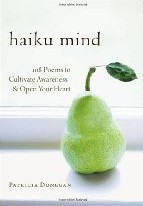Haiku Exercise 1: brief 3-line nature poem with two juxtaposed images
Haiku exercises from a Poetry Seminar
given at UCSC November 2009 by J. Zimmerman
Your first three haiku:
Exercise 1: preliminaries for your brief 3-line nature poem with two juxtaposed images
A haiku
is a breath-sized "nature" poem whose subtext communicates feelings.
"It's hard to tell you how I am feeling.
Perhaps if I share with you the events that made me aware of these feelings,
you will have similar feelings"
(Higginson, 1985).
"Haiku ... record those moments which for some mysterious reason have a peculiar significance"
(Blyth, 1949).
"Haiku should be as simple as porridge"
(Jack Kerouac).
Initial goal:
- Write at least THREE haiku-like poems through three exercises:
- Learn and apply THREE core attributes of a "classical" haiku.
- Explore history of linked verse and the rise of haiku and senryu.
- Share resources: books, journals, web sites, places to submit work.
Exercise 1:
brief 3-line nature poem with two juxtaposed images
- To get started on your first 3-line poem, use this as your first line:
- Notice that this is very few syllables, only a couple of words.
- Think of an image that denotes someone or something you are missing,
e.g. a place in nature you went with them, or would like to be with them.
- After the given line ("autumn loneliness") write two lines about your own image.
Try to make the lines "short-long-short" with the second line
a little longer than the given line and with the third line about the same length as the given line
... but don't sweat it.
- Keep the poem open: omit yourself (the "I").
-
Here is a brilliant example (reprinted by permission):
autumn loneliness ...
over the dunes spent blossoms
scatter in the wind
[Michael Sheffield (Geppo 34:5, p.4, 2009)]
|
Notice that not only does Sheffield's poem include a kigo and a second and powerful juxtaposed image,
but it also uses the challenging '5-7-5' syllable count.
It is relatively rare for an English-language haiku to use that many syllables
without feeling padded or forced.
It sets a high bar for our next poem,
Exercise 2: a brief 3-line nature poem
with two juxtaposed images using '5-7-5' syllable count.
 [Thanks for visiting.]
[Thanks for visiting.]







